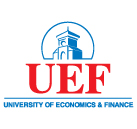FACULTY OF ENGLISH
Events
Evaluation of student research projects, spreading the value of sustainable education
04/28/2025
April 28, 2025
Continuing the series of ongoing research activities at UEF, the Faculty of English held a student scientific research project evaluation session for the 2024–2025 academic year on the morning of April 26. The evaluation committee was chaired by MA. Lê Công Thiện, with MA. Trần Thị Dung as reviewer and MA. Hoàng Thị Ngọc Hiền as member.
At the session, six outstanding research projects were presented, reviewed, and evaluated. The projects mainly focused on current issues in English language education (EFL) and sustainable education in Vietnam, demonstrating the students’ dedication to research, creativity, and innovative thinking at UEF.
.jpg)
The research projects not only demonstrate the students’ language competence but also address real-world issues in the field of education.
Opening new perspectives on English language education
In the field of English language education, the project “Navigating EFL Underprivileged Students’ Needs and Problems: A Study at a Universal Education School in Ho Chi Minh City” made a strong impression by investigating the real needs and challenges faced by underprivileged students in learning English. The study not only clarifies the issues encountered by this group but also proposes practical support measures within an inclusive educational environment.
Another timely and relevant topic is “Investigating the Prevalence and Potential Impact of Neuromyths on EFL Teaching Practice: Perspectives from Vietnamese Undergraduate Teacher Candidates.” The project provides an in-depth analysis of common misconceptions about the brain (neuromyths) and their influence on English teaching methods among teacher trainees. The findings offer critical insights and guidance for improving the quality of future teacher education.
.jpg)
.jpg)
.jpg)
Students confidently presented the outcomes of their research before the Evaluation Committee.
Meanwhile, the research project “The Role of Informal English Language Exposure on Writing Proficiency” offers valuable insights into the impact of out-of-class English exposure - through movies, social media, and casual conversations - on students’ writing development. This study reflects the growing trend of experiential language learning in the digital age.
Another project focusing on effective learning techniques is “The Perception of UEF’s English Major Third-Year Students on Using the Shadowing Technique to Improve Speaking Skill.” The researchers analyzed and evaluated the use of the shadowing technique - simulating pronunciation from models - to enhance speaking skills, and proposed practical training methods suitable for Vietnamese learners.
Spreading the Spirit of Sustainable Education
Beyond the field of linguistics, UEF English majors also demonstrate social responsibility through the project “Towards Sustainable Education: Shaping the Students’ and Teachers’ Roles in Addressing Environmental Concerns.” The study highlights the importance of integrating environmental education into schools, calling for the joint efforts of both teachers and students to foster an education system oriented toward sustainable development.
.jpg)
The research content reflects not only the students’ academic expertise but also their sense of social responsibility.
In addition, the project “Vietnamese EFL University Students’ Engagement in Language Learning in Game-Based Environments” explores the potential of game-based learning in enhancing students’ motivation and effectiveness in English learning. The research highlights the importance of technology and entertainment elements in innovating language education.
All the projects evaluated in this session clearly reflect a spirit of serious academic inquiry, the ability to apply theory to practice, and the proposal of highly applicable solutions. Through each study, UEF English majors have demonstrated sharp critical thinking, an awareness of modern educational trends, and a profound sense of social responsibility.
.jpg)
.jpg)
The Evaluation Committee provided constructive feedback to help students further improve their research projects.
The research project evaluation session served as an opportunity to recognize students’ academic achievements and as an important stepping stone for them to develop research skills. It also helped equip them with a solid foundation for their academic journey and future careers in an increasingly globalized environment.
RELATED NEWS










